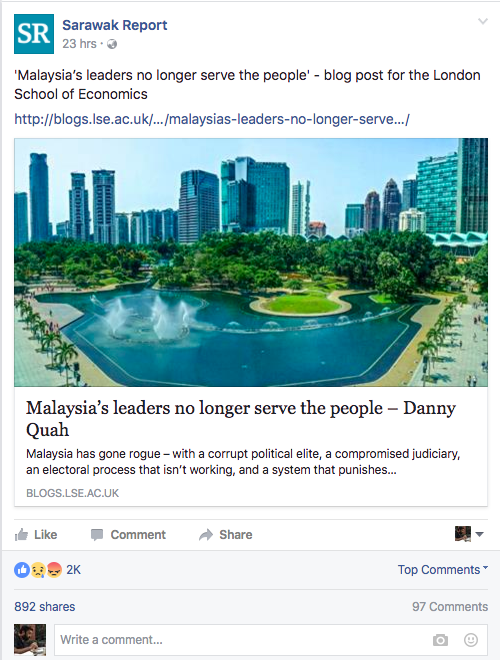This Scathing Article Against Najib By Professor Of Economics At NUS Is Going Viral Again!
"(Malaysia) has gone rogue," wrote the professor, who is from Penang.
A year-old blog post featured on the website of London School of Economics (LSE) Department of International Development has once again gone viral on social media thanks to Sarawak Report resurfacing it by posting on their Facebook page on 6 November
The reason it is going viral again is that it resonates more with Malaysians now than it did when the article was written a year ago. It speaks of the gravity of the political crisis and the sheer amount of corruption that has crept into it.
The article was written by Danny Quah, the former Professor of Economics and International Development at the LSE and Political Science. Quah wrote the article, originally published at The Diplomat, when he was still at the LSE, on 8 August last year.
A Penangite by birth, Quah, who is currently the Li Ka Shing Professor of Economics at the Lee Kuan Yew School of Public Policy, National University of Singapore, had served as Council Member on Malaysia's National Economic Advisory Council.
In the article, which is a scathing attack on the leadership of PM Najib Razak and the utter failure of his dream project, 1MDB, Quah writes, "Malaysia has gone rogue – with a corrupt political elite, a compromised judiciary, an electoral process that isn’t working, and a system that punishes whistle-blowers."
Quah's article begins with the premise of how, in 1971, Malaysia embarked on one of history's boldest and most noble experiments to reduce social disparity through its New Economic Policy (NEP)
Malaysia's NEP, Quah writes, sought to "eradicate poverty for all" and "eliminate identification of race by economic function and geographic location".
"This polity ... was setting out to solve the massive problem of injustice and inequality over which other societies much more mature continued to struggle.
"Over the decades that followed, the NEP's mantra would serve as a backdrop to almost all political discourse in the country. NEP-themed policies would, among much else, flesh out the concept of Bumiputera – an ethnic-driven formulation of native peoples in Malaysia," wrote the former visiting assistant professor of economics at Harvard.
While acknowledging how difficult it is to grow an economy, and at the same time reduce ethnic and rural-urban inequality while maintaining social harmony among diverse ethnic and religious groups, Quah praises the remarkable manner in which Malaysia succeeded. In his lengthy article, he writes:
"From tropical jungle, Malaysia has grown to have an average income now well above the world emerging-economy average. Its urban infrastructure and worker skills approach those in the first world. Malaysia’s top bankers, businesspeople, and entrepreneurs are admired everywhere.
"NEP reduced pockets of extreme poverty and created a significant, thriving, and successful Bumiputera middle class – a group of professionals and intellectuals whose contributions to Malaysian society would be the pride of any country."
However, he goes on the offensive using his article's premise, the NEP, highlighting how despite its noble the goal of reducing social disparity, it has seen the emergence of an increasingly hateful race-based narrative to the country's political and economic strategies
Quah points out that while PM Najib, who had the backing of all Malaysians in early 2010, sought to revise the NEP with "a national development strategy more transparent, merit-driven, and market-friendly, and towards a new needs-based affirmative action", he writes, "elements within the prime minister’s political party mounted significant pushback, the moment passed, and he did not stay the course."
"Open democratic process has not kept in check the rise of extremists rallying together the Bumiputera grassroots, good people who have been told this time will be different, this time more of the same will help them, despite its having failed to do so these last 50 years. Since 2010 no one has been able to recount significant action on that announcement."
He even mentions the one time Najib played golf with Obama.
Image via NICHOLAS KAMM/AGENCE FRACE-PRESSE/GETTY IMAGES via WSJQuah's most scathing attack on Najib comes in the form of 1MDB, which has been exploited for self-interest by "a Malaysia of cronies"
He writes how 1Malaysia Development Berhad (1MDB), an investment fund which was set up to steward Malaysia's resources, "has seen billions of dollars of public money moved around the world in suspicious circumstances, with allegations that hundreds of millions of dollars were funnelled into the prime minister’s personal bank accounts."
He then lists down the number of "egregious action" that followed suit, from shutting down the press to the reshuffling of the Cabinet to replacing the Attorney-General and freezing the PAC which stopped all further proceedings.
While writing that Malaysia "again needs to have a government that runs for the well-being of its people", Quah's article rips apart the current Malaysian political leadership under Najib, which, he writes, "no longer articulates a vision that serves Malaysia's people"
The Professor of Economics concludes his article by writing these few lines, which appear to resonate with the Malaysian citizen due to the level of magnitude it carries:
"(Malaysia), one of Britain’s greatest friends ... that admired and reflected the grand British ideals of democracy, rule of law, free speech ... has gone rogue.
"It does not take authoritarian autocracy to run a country into the ground. Regardless of the system of government, it takes only political elites out of touch with their people, a co-opted judiciary, an electoral process that even while open fails to surface progressive leadership, and a system that keeps to the law but fails to protect those speaking truth to power. Malaysia now has all of these sorry attributes."
You can read the article in full here
Additionally, do comment to let us know what do you think about it.


